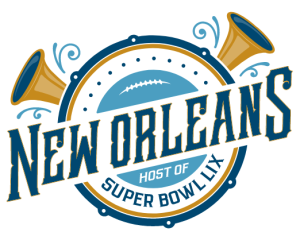Super City, River City

On February 9, more than a third of all Americans will likely tune in to watch Super Bowl 59, with the defending champion Kansas City Chiefs taking on the Philadelphia Eagles. The game is the 11th Super Bowl held in New Orleans, which ties the city with Miami for the most National Football League (NFL) championship games hosted. It also represents the eighth Super Bowl to be held in the venerable-yet-modernized Caesars Superdome, the most of all time and two more than Miami’s Hard Rock Stadium. New Orleans’ first three Super Bowls were held at old Tulane Stadium.
New Orleans residents and tourists were treated to a week’s worth of Super Bowl-related activities, including the NOLA Super Bowl Experience, the first-ever Super Bowl parade (a Mardi Gras-style parade that meandered through the French Quarter), the Louisiana Culture Festival at the French Market, a laser light show illuminating St. Louis Cathedral and more.
No doubt, one of the most eye-catching elements of the Super Bowl festivities in New Orleans was the pair of super yachts in town for the game. Arthur Blank, owner of the Atlanta Falcons, docked his yacht DreAMBoat near Audubon Park, while Jaguars owner Shahid Kahn’s 400-foot-long yacht Kismet was docked at the Moon Walk, near the steamer Natchez.
In the run up to the big game, local tourism and sports leaders marketed New Orleans as a “super city” unlike any other that’s also “built to host” a wide range of special events. The city’s portfolio of big events certainly supports that claim.
But aerial videos during the game and the presence of Blank and Kahn’s super yachts docked along the Mississippi River highlight New Orleans’ deeper identity, day in and day out. It’s what led Jean-Baptiste Le Moyne de Bienville to found the city in the spring of 1718.
This is, above all, a river town, through and through. It’s where the city’s fresh water supply comes from. The Mississippi River is what funnels most of the nation’s grain exports through New Orleans. The river is indispensable, not just to the city and state, but to the nation and the world.
New Orleans residents are happy to share again with Super Bowl fans what we in the maritime industry have long known about our maritime heritage. New Orleans—and by extension this nation—is built on and is dependent on our waterways and the cargoes that move on them.



